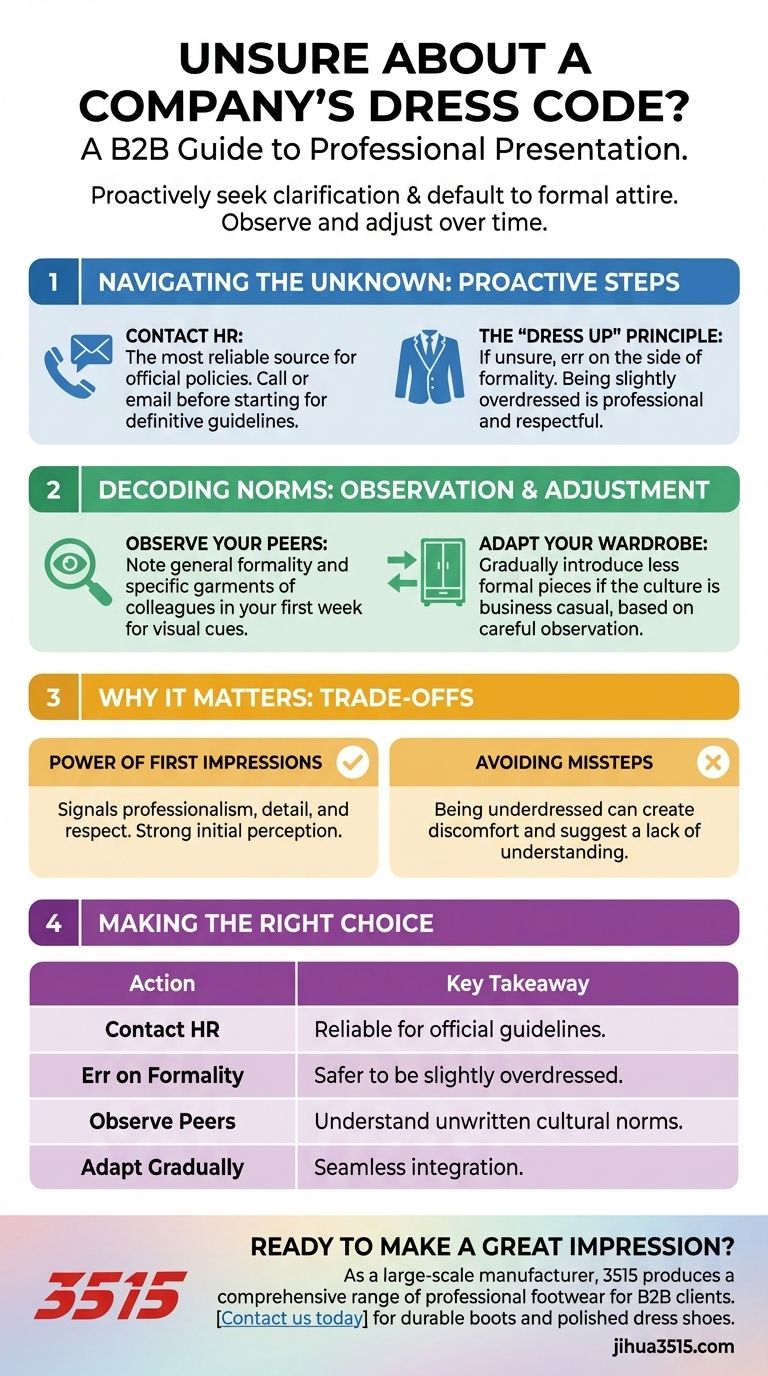If you are unsure about a company's dress code, the most effective approach is to proactively seek clarification and, when in doubt, default to a more formal attire. This strategy helps ensure you make a positive first impression and align with the company's professional expectations from day one. Observing your new colleagues will then guide your adjustments over time.
When faced with uncertainty regarding a company's dress code, always prioritize professional presentation. Reach out to HR for definitive guidelines, and if the details remain vague, choose conservative, formal attire. This approach safeguards your first impression and allows you to subtly adapt as you observe the workplace culture.

Navigating the Unknown: Proactive Steps
Uncertainty about workplace attire is common, especially before starting a new role. Taking proactive steps can alleviate anxiety and set a positive tone.
Contacting Human Resources (HR)
The most direct and reliable method is to contact the company's Human Resources department. They are the official source for company policies, including dress code guidelines. A quick phone call or email before your start date can provide clear instructions and prevent any guesswork.
The "Dress Up" Principle
If direct clarification isn't possible or the information received is vague, always err on the side of formality. It is generally safer to be slightly overdressed than underdressed in a professional setting. This conveys respect for the company, the role, and your colleagues.
Decoding Workplace Norms: Observation and Adjustment
Once you begin your role, careful observation becomes your primary tool for understanding the unwritten rules of company attire. This process allows you to refine your wardrobe choices subtly.
Observing Your Peers
Pay close attention to what your direct colleagues and those in similar roles are wearing during your first week. Note the general level of formality, the types of garments, and whether there are different expectations for various departments or days of the week. This provides valuable visual cues about the accepted norm.
Adapting Your Wardrobe
After observing for a few days or weeks, you can begin to adjust your attire to better match the prevailing culture. If you initially dressed formally and notice a more business casual environment, you can gradually introduce less formal pieces. This ensures a smooth integration without any noticeable missteps.
Understanding the Trade-offs: Why It Matters
Your attire significantly impacts how you are perceived professionally, especially in the early stages of a new job. Understanding these implications helps underscore the importance of dressing appropriately.
The Power of First Impressions
A well-chosen outfit contributes to a strong first impression, signaling professionalism, attention to detail, and respect. It can influence how colleagues and superiors initially perceive your capabilities and commitment. Conversely, inappropriate attire can inadvertently create a negative perception that is hard to overcome.
Avoiding Missteps
Being underdressed or dressed inappropriately can create discomfort for both you and those around you. It might suggest a lack of understanding of professional norms or a disregard for company culture. While often unintentional, these missteps can sometimes be misinterpreted, highlighting the need for careful consideration.
Making the Right Choice for Your Goal
Navigating dress code uncertainty is about balancing comfort, professionalism, and company culture.
- If your primary focus is making the strongest possible first impression: Always opt for business formal attire, even if you suspect the environment is more relaxed.
- If your primary focus is clarity and avoiding guesswork: Contact HR directly before your first day to get official guidance.
- If your primary focus is seamlessly integrating into the company culture: Start formally and then subtly adjust your wardrobe based on careful observation of your colleagues during your initial weeks.
By combining proactive inquiry with strategic observation, you can confidently navigate any dress code uncertainty and present yourself professionally.
Summary Table:
| Action | Key Takeaway |
|---|---|
| Contact HR | The most direct and reliable method for official guidelines. |
| Err on the Side of Formality | It's safer to be slightly overdressed than underdressed. |
| Observe Colleagues | Use your first week to understand the unwritten cultural norms. |
| Adapt Gradually | Refine your wardrobe based on observations for seamless integration. |
Ready to Make a Great Impression?
As a large-scale manufacturer, 3515 produces a comprehensive range of professional footwear for distributors, brand owners, and bulk clients. Whether you need durable boots for industrial settings or polished dress shoes for corporate environments, our production capabilities encompass all types of shoes and boots to meet your exact dress code requirements.
Contact us today to discuss how we can supply the perfect footwear to help your team look and feel professional.
Visual Guide

Related Products
- Wholesale Comfortable Business Casual Shoes Custom Manufacturing
- Durable High-Traction Canvas Sneakers Wholesale & Custom Manufacturing
- Wholesale Leather Ankle Boots with Lug Soles for Custom Brand Manufacturing
- Wholesale Modern Business Shoes with Dial Closure System for Bulk Orders
- Wholesale Comfort Dress Shoes with Dial Closure for Custom Manufacturing
People Also Ask
- What are the advantages of laser welding for piezoelectric energy harvesters? Achieve Precision and Durability
- What is the function of high-performance diodes in intelligent pressure monitoring circuits? Enhance Signal Integrity
- Which option is better for serious cold-weather riders? Invest in Superior Performance with Dedicated Boots
- How do microprocessor-controlled prosthetic feet achieve compatibility with various footwear? Master Heel Adjustment
- Why are slippers practical for everyday wear? Effortless Comfort & Convenience for Modern Life
- How does industrial 3D printing technology address production challenges in footwear? Overcome Design & Speed Barriers
- What is the purpose of selecting blue, green, and lilac for sensory footwear? Enhance Comfort with Color Psychology
- How did Goodyear Welt Construction evolve historically? From Handcrafted Luxury to Industrial Standard



















